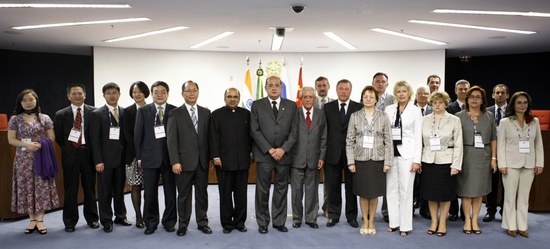
First BRICS Exchange Program for Judges in Brasília, 2010
Following the signature in 2009 of the Protocol of Intent among the BRIC countries’ Supreme Courts, the “I Exchange Program for Magistrates and Judges of BRIC countries” was held in March 2010 in Brazil. The schedule of activities was prepared by the National School for Development and Improvement of Magistrates (ENFAM) with the aim of presenting to judges the composition and functioning of Brazilian judicial system and allowing visitors to share experiences of their countries regarding the organization of the judiciary and contemporary issues such as independence and reform of the judiciary.
Judges from Russia, China, India and Brazil participated in the activities of the first edition. Its activities lasted over 12 days. Internationalizing the BRICS’ respective judiciaries is to be welcomed. Exchange programs provide opportunities for judges to visit another country and learn about different interpretations and application of the law. This may be particularly relevant for judges in China and Russia, where the courts are controlled by the government. It is more questionable what a Brazilian or an Indian judge can learn from his or her Russian or Chinese counterpart.
Possibly due to these restrictions, the BRICS exchange program was discontinued after its first edition. Granted, it could have been politically difficult to justify why the tax payer should pay for five Brazilian judges to travel to China. In Brazil, the program included items such as “Recent projects in the human rights area”, a discussion that may have created some awkward moments.
Still, the interaction of an exchange program for judges should be continued particularly because all the BRICS suffer from similar problems the judiciaries could address: a massive backlog of cases that reduces the BRICS’ competitiveness, legislation in dire need of simplification and debureaucratization, and large-scale corruption that makes many foreign investors think twice before coming to the BRICS. The Brazilian Supreme Court’s recent decision to tackle corruption could serve as an interesting case study for judges in India, South Africa, Russia and China.
Read also:
Towards stronger intra-BRICS trade?
What can the BRICS Academic Forum achieve?
A tale of five BRICS sister cities
Agriculture and food security: Brazil’s chance to assume leadership among the BRICS?
Photo credit: Supremo Tribunal Federal








